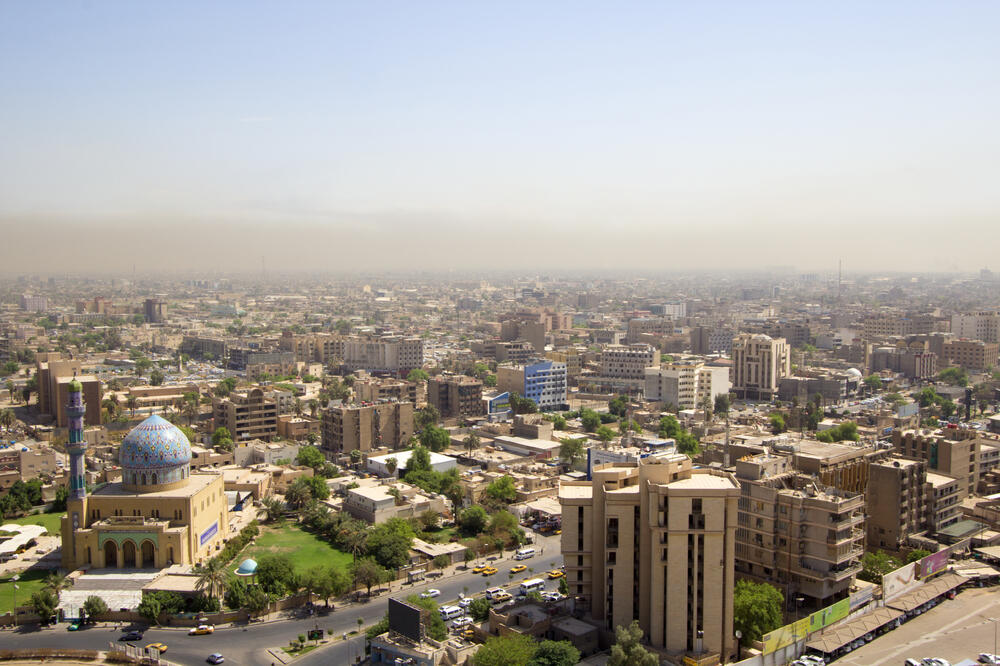The drone attack on the residence of Iraqi Prime Minister Mustafa al-Kazimi on November 7, after several weeks of tensions between the government in Baghdad and pro-Iranian militant groups who claim to be the victims of electoral fraud in the parliamentary elections held last month, could be a prelude to a dangerous escalation, world media write.
An explosives-laden drone attacked the Baghdad residence of Iraqi Prime Minister Mustafa al-Qazimi early Sunday, Nov. 7, in what Iraqi security officials said was an assassination attempt, marking an escalation in tensions between the Baghdad government and Iran-backed militant groups, he wrote. The Wall Street Journal.
The attack followed threats made by leaders of pro-Iranian militant groups against Kazimi, although the armed groups denied responsibility, the American newspaper points out, adding that tensions escalated sharply in Iraq's post-election dispute after on November 5, outside Baghdad's safe Green Zone - the central area where government institutions and foreign embassies are located - a demonstrator was killed.
Kazimi, who addressed the nation on television shortly after the attack, said he was not injured, while a statement by Iraqi security forces called the incident "a failed attempt to assassinate the prime minister and commander-in-chief."
The apparent assassination attempt, the Wall Street Journal points out, adds to the political turmoil following last month's parliamentary elections in Iraq in which Iran-backed militant groups claimed the vote was rigged. Tehran's allies suffered a significant defeat in the election as voters favored nationalist and other forces in the country, the newspaper added.
The attack, which targeted the top of the Iraqi government, represents a departure from previous attacks by Iran-backed paramilitary groups. The Wall Street Journal highlights how they have carried out a series of drone attacks on US forces in Iraq and Syria in recent months.
Three drones
Moments after the attack, Iraqi Prime Minister al-Kazimi took to Twitter to call the rocket and drone attacks cowardly, and called for a peaceful and constructive dialogue "for the sake of Iraq and the future of Iraq," CNN reported.
According to the statement of Iraqi officials, three drones were involved in the attack, but the security forces managed to shoot down two, while the third, as a result of the explosion, wounded several guards of the prime minister's residence, causing minor damage.
No one has claimed responsibility for the assassination attempt, but it comes amid heightened tensions in the capital, the American television channel emphasizes. The State Department condemned the attack on the prime minister's residence as a "blatant act of terrorism," saying it was in contact with Iraqi security forces and had offered to assist in the investigation.
Meanwhile, CNN points out, the secretary of Iran's Supreme National Security Council, Ali Shamkani, condemned the assassination attempt, saying in a tweet on Sunday that the incident could have been caused by "foreign think tanks" that, he said, had brought nothing "but insecurity, discord, and instability of the oppressed Iraqi people".
Kataib Hezbollah, one of Iraq's most powerful Shiite militant groups backed by Iran, denied any involvement in the assassination attempt on the prime minister, while spokesman Abu Ali al-Askari questioned the government's position on the attack. Askari said Kazimi was "playing the victim", adding that there were "cheaper" and more effective ways to harm the prime minister - if that was the aim.
Marginalization of Fatah
The drone strike, as well as gunfire heard across central Baghdad, came hours after Iraqi supporters of Iran-linked militant groups held a funeral march for a man killed by security forces on Friday, November 5, when a crowd tried to storm into the heavily fortified Green Zone, wrote the Washington Post (The Washington Post).
More than 125 people were wounded in the clashes, most of them members of the security forces, as supporters of pro-Iranian militant groups rejected the results of Iraqi parliamentary elections held on October 10. In the elections, the paper adds, the populist Shia cleric Moktada al-Sadr won the most seats in the parliament, while the Fatah alliance linked to Iran suffered a significant loss.
The spike in tensions over the weekend followed indications that Sadr may be continuing to form a government that marginalizes Fatah. The Iran-backed alliance has lost popularity in Iraq in recent years, after its militant groups were involved in the killing of hundreds of young men and women who joined an anti-government insurgency in 2019.
The demonstrations began as a cry against corruption, but quickly turned into a rebellion against the entire political system. The Oct. 10 election was held earlier as a concession to the protesters, but, the Washington Post adds, most Iraqis ultimately chose not to vote, citing deep disillusionment with the prospect of the election changing what they see as a largely unaccountable political system.
Armed groups linked to Iran have been blamed for dozens of missile and drone strikes on the Green Zone and other US-linked military targets in recent years, with the pace often increasing during sensitive political moments, the Washington paper said.
The balance of relations with Washington and Tehran
Before becoming prime minister in May last year, Mustafa al-Kazimi, 54, was the head of Iraq's intelligence service. Supporters of pro-Iranian armed groups believe that he is close to the US and that he tried to find a balance between Iraq's relations with Washington and Tehran, The Guardian points out.
Ahead of the October election, the Iraqi prime minister hosted several rounds of talks between regional foes Iran and Saudi Arabia in Baghdad in an attempt to ease regional tensions.
Although the US, the UN Security Council and others praised the Oct. 10 election, which was largely violence-free and without major technical glitches, supporters of pro-Iranian militant groups pitched tents near Baghdad's Green Zone, threatening violence if their demands for a recount were not met. votes.
After the protests turned deadly, with an exchange of fire on November 5 that left one protester dead and dozens of police officers injured, al-Kazimi ordered an investigation to determine what sparked the clashes and who violated the no-open orders fire. But, the newspaper points out, some leaders of pro-Iranian militant groups openly blamed Kazimi for Friday's clashes and the deaths of protesters.
After the drone attack on the Prime Minister's residence, the Guardian points out, the spokesman for the Supreme Commander of the Iraqi Armed Forces said that the security situation in the Green Zone was stable on Sunday, while the pictures published by the state news agency INA show damage to some parts of the Prime Minister's residence and damaged field equipment. vehicle parked in the garage.
A sign of dangerous escalation
With the assessment that the attack on the prime minister's residence could mark a dangerous escalation, in its analysis the BBC emphasizes that after the elections, Iraq found itself in a long and difficult process of trying to form a ruling coalition.
Voter turnout in the election was a record low - just 41 percent - and this lack of engagement shows that many Iraqis do not believe that real change awaits them.
While the pro-Iranian parties fared worse than they had hoped, losing many seats in parliament, on the other hand, the British Public Service points out, the Shia Muslim cleric Moqtada al-Sadr, whose party won the most seats, is in favor of a government without foreign interference - which is most importantly from Iran and the West. He wants to end Tehran's influence on Iraq's internal affairs.
These political dividing lines mean that tensions are high, and the assassination attempt on Prime Minister al-Kazimi could prove to be a dangerous escalation with far-reaching consequences, the BBC concludes.
Bonus video:





